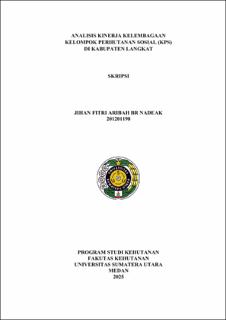| dc.description.abstract | Social forestry has been initiated as an effort to maintain forest sustainability while enhancing community welfare. Langkat Regency has established 61 Social Forestry Groups (KPS) under various schemes, with diverse institutional performance across groups. This study aims to analyze the institutional performance of KPS and the influencing factors using a qualitative descriptive method, employing SK P.43/2016 on Wana Lestari Implementation as the assessment instrument, along with SWOT analysis. Data were collected through interviews, observations, and document reviews on three KPS with different schemes. The results indicate performance variations: KTH Penghijauan Maju Bersama scored 72.6 (Good), KTH Perduli Pesisir 59.8 (Fair), and LPHD Pasar Rawa 52.3 (Fair). Internal strengths supporting performance include organized governance, complete administration, and high member participation, while weaknesses involve leadership dominance, limited human resource capacity, restricted funding, and low member participation. External challenges consist of insufficient local government support and difficult accessibility, which hinder group performance. This study highlights the need to strengthen internal capacities and address external constraints to improve the institutional performance of social forestry groups. | en_US |


